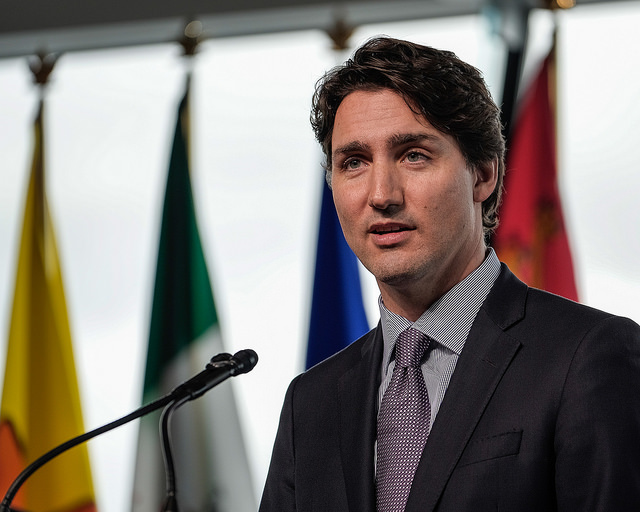Like this article? rabble is reader-supported journalism. Chip in to keep stories like these coming.
Prime Minister Justin Trudeau had a full slate of climate talks this week, including an announcement committing to two significant funding initiatives promoting climate resilience.
The first was a $75 million allotment to the Federation of Canadian Municipalities to support local governments in reducing emissions, while the second was a $50 million investment in improving climate resilient building and infrastructure codes across Canada.
First Nations leaders face minimal inclusion
Following this announcement on Wednesday, Trudeau and the provincial and territorial premiers met with First Nations leaders to discuss how they can work together to address climate change — a partnership that Indigenous leaders strongly called for.
“Indigenous Peoples are uniquely positioned to address climate change. We are observing and experiencing firsthand, on the ground, the devastating impacts of climate change,” said the First Nations Leadership Council in a statement. “We have many thousands of years of traditional knowledge about our territories and bring to the table important, relevant and unique perspectives on how the environment is changing, the causes of this change, and solutions for addressing impacts and restoring habitat.”
In spite of these significant perspectives, some Indigenous groups were left without an invitation to the discussion including the Native Women’s Association of Canada (NWAC) and the Congress of Aboriginal Peoples.
“During this critical First Ministers Meeting in Vancouver, without clear explanation or justification, the Native Women’s Association of Canada was not invited,” said Dawn Lavell-Harvard, President of NWAC in a statement. “Choosing to exclude the Native Women’s Association of Canada from the First Ministers Meeting was unfair, and speaks volumes to the ongoing lack of respect for Indigenous women’s and girls’ voices in Canada.”
Those First Nations leaders that were invited to attend, however, left the meeting feeling frustrated and unsure of the steps ahead.
“It was all about economic development on transition from green energy to green economy,” said Chief Allan Adams of Athabasca Chipewyan First Nation to the media after the meeting. “There was nothing in there that said it was credible enough to say that we walked away with a tangible agreement.”
Premiers agree on Vancouver Declaration
Canada’s premiers also met this week to discuss a framework for clean energy and climate change. On Thursday, they emerged from their meeting with the Vancouver Declaration on Clean Growth and Climate Change — a nation-wide strategy to grow the economy while reducing emissions.
The declaration included a commitment to actions such as investing in green infrastructure, doubling government investment in clean energy research and development over the next five years, and implementing carbon pricing mechanisms, though specifics on the latter were not offered.
“This is not going to be easy. Canada’s provinces have very different climate and energy challenges. But building a clean energy economy requires leadership from the very top, and from every part of this country,” said Merran Smith, Executive Director of Clean Energy Canada in a statement. “[Thursday’s] agreement gets the right people — federal and provincial leaders from coast to coast to coast — working to make Canada’s clean energy transition a national success story.”
However, some expressed their disappointment with the meeting particularly when it came to carbon pricing.
“Canada will never act on climate if we continue to play to the lowest common denominator, said Peter McCartney Climate Campaigner for the Wilderness Committee in a statement. “We need aggressive climate action and what we got today was vague aspirations.”
Alyse Kotyk is a Vancouver-based writer and editor with a passion for social justice and storytelling. She studied English Literature and Global Development at Queen’s University and is excited by media that digs deep, asks questions and shares narratives. Alyse was the Editor of Servants Quarters and has written for the Queen’s News Centre, Quietly Media and the Vancouver Observer. She is now rabble’s News Intern.




